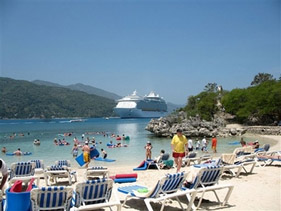Row over cruise sustainability

Are they greenwashers or aren’t they?
After being slammed by a report coming out of the same stable as the International Centre for Responsible Tourism, not only have the cruise companies fought back but the academics have refused to budge.
Last week the global cruise industry was slammed by academics at Leeds Met University
They were heavily criticised in a report for ignoring their corporate social responsibility to their staff, the environment and the destinations they visit.
The report said cruise companies are failing to provide meaningful data about what they’re doing to minimise their environmental and social impact and to show whether they are making any progress.
It also accused the cruise industry of violating the rights of some workers, not doing enough to protect marine eco-systems, having a negative economic impact on some of the destinations they visit, and not being transparent with reporting data.
According to the university’s research, 65% of the 80 cruise companies worldwide analysed do not even mention corporate social responsibility on their websites.
Said the report, only 12 brands publish corporate social reports, and these belong to four companies – Carnival Corporation, Royal Caribbean International, TUI and Disney Cruises. Reporting on emissions, effluents, waste or water is the result of eco-saving strategies and regulatory pressure. But not one of the 80 companies reports on the sustainability of the resources consumed or biodiversity actions, and few disclose their positive social or economic impact on destinations.
The report also slammed cruise workers human rights and employment conditions .
But the cruise lines have fought back…
In a statement released on Friday, CLIA UK (the Cruise Lines Association) said it found the report "deeply disappointing" and claimed it was "seriously flawed with inaccuracies and subjective commentary which fly in the face of the facts of the achievements that the cruise industry delivers throughout the world".
"The cruise industry is highly regulated on an international basis to exacting standards towards both the environment and labour welfare," it said.
"In both areas we go above and beyond those high thresholds to enable our 21 million annual global customers to enjoy the seas in which they cruise and be cared and looked after by a motivated and content workforce.
"We put great store into our social responsibilities and we make an enormously positive impact on national economies all around the world, to the tune of €37.9 billion a year in Europe. A recent study also shows cruising contributes €72 billion to the global economy, supports more than 775,000 jobs, and pays €24 billion in wages."
Cruise giant Carnival, which owns P&O Cruises, Cunard, Princess Cruises and seven other cruise brands, also disputed the report’s findings.
Roger Frizzell, chief communications officer for Carnival Corporation, said the group places the "upmost importance on being a responsible and sustainable corporate citizen".
"A review of Carnival’s sustainability reports very clearly shows a compilation of hard facts and figures tied to specific goals and results that are set in advance and measured on an ongoing basis," he said.
"We absolutely understand the important of being open and transparent. For that reason, we have published sustainability reports for 2012, 2011 and 2010 on our website, and we expect our 2013 report to be completed soon. Our reports contain very detailed measurable goals and results, often tied to global ISO standards, as well as details on the company’s actions and direction."

However the academics have refused to budge, authors of the report have shared their methodology with TravelMole Vision on Sustainable Tourism and Xavier Font of Leeds Met commented from the Responsible Tourism Destinations Conference:
"Although it is true that the great majority of companies do not report, some are making a difference. As I write this I am listening to Paul Britton, marine operations manager of TUI Cruises, show how they are making operational changes to reduce their carbon (and fuel) to increase customer satisfaction, number of ports visited and cut costs. The challenge comes with the aspects of sustainability that can’t easily achieve increased revenue or reduced costs."
Valere Tjolle
Get the report: http://repository.leedsmet.ac.uk/main/view_record.php?identifier=8646&SearchGroup=Research
Latest Sustainable Tourism Report Offer Ministers Briefing Review offer
 United Kingdom
United Kingdom United States
United States Asia Pacific
Asia Pacific












































Dozens fall ill in P&O Cruises ship outbreak
Turkish Airlines flight in emergency landing after pilot dies
Boy falls to death on cruise ship
Unexpected wave rocks cruise ship
Woman dies after going overboard in English Channel